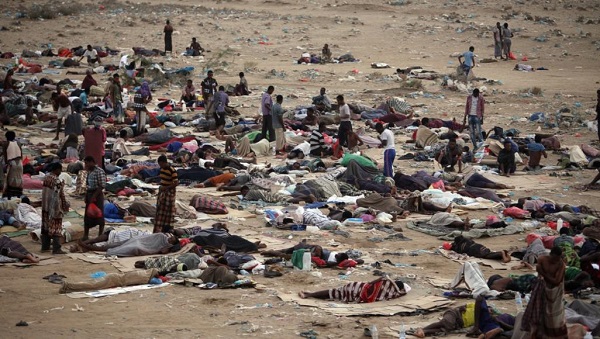The United Nations accuses Saudi Arabia of committing massacres on the Yemeni border against migrants

The United Nations Migration Organization accused the Saudi authorities of committing several massacres on the Yemeni border against African migrants by targeting them for direct killing.
The organization reported that its teams recorded nine massacres that killed more than 189 African migrants and injured 535 others.
The organization pointed out what African refugees are exposed to in the north of Saada governorate, pointing out that the migrants were targeted by the Saudi border guards with artillery and heavy machine guns.
The border areas between Yemen and Saudi Arabia remained subject to bombardment from the Saudi side, despite the entry into force of the armistice.
In recent months, the authorities in Saada Governorate announced that several civilians were killed and injured due to the continuous bombing.
In its report, the organization pointed to the increase in human rights violations against migrants in Yemen in light of the increase in migrants arriving.
Last year, the International Organization for Migration reported that an estimated 27,700 migrants entered Yemen via the so-called eastern route, a marked decrease compared to the 138,000 arrivals in 2019 who arrived in Yemen.
This decrease is due to the increase in movement restrictions imposed by the emerging Coronavirus, and in 2020, 37,500 people took this trip.
The rise in migrant arrivals is a cause for concern, particularly in a country that has gone through the eighth year of conflict.
Human Rights Watch had accused the Houthi forces of expelling thousands of Ethiopian migrants from northern Yemen and forcing them to migrate to the Saudi border.
The organization stated that the Saudi border guards shot the fleeing migrants, killing dozens, while hundreds of survivors fled to a mountainous border area.
“We are increasingly concerned about the safety of people on the move through Yemen, as our teams meet every day with migrants injured by conflict or stranded on their journeys,” said Christa Rottsteiner, Chief of Mission for the International Organization for Migration.
The increase in arrivals this year could be attributed to several factors, including the ease of movement restrictions imposed due to the Coronavirus, favourable weather conditions, the security situation and drought in Ethiopia – the country from which most migrants come.
On arrival in Yemen, migrants face dangerous journeys to reach the Gulf states in search of work.
They often pass through conflict areas and face serious abuses such as detention in inhumane conditions, exploitation, and forcible transfer out of control.
Women and girls often report being subjected to gender-based violence, abuse and exploitation, mainly at the hands of smugglers and human traffickers.
In the north of the country, IOM partners and the local community reported that more than 1,000 migrants this year – including women and children – have been injured or killed due to attacks and deliberate targeting at the border by Saudi security forces.
Each month, hundreds of migrants receive treatment for gunshot wounds at an IOM-supported hospital near the border city of Saada. For survivors, some may lose limbs, and others may be paralyzed.
In Marib, about 25 kilometres from one of the front lines, some 4,500 migrants are stranded in the conflict-affected city, unable to continue their journey or return.





